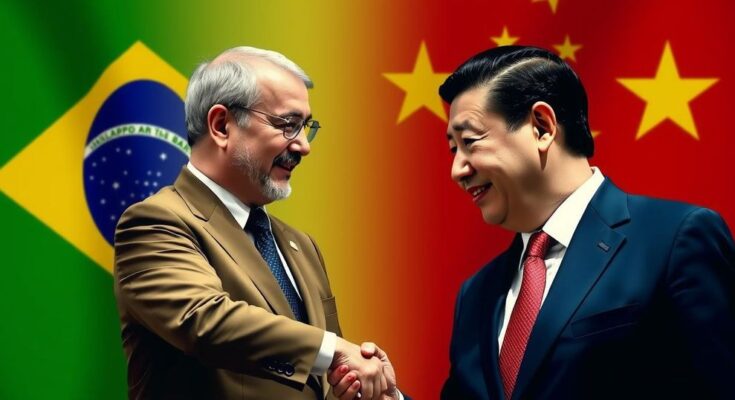Brazilian President Luiz Inácio Lula da Silva welcomed Chinese President Xi Jinping for a significant state visit aimed at deepening ties between the two nations. They signed 37 agreements across various sectors, furthering Brazil’s strategic realignment on the global stage. Analysts believe this partnership may strengthen as Donald Trump potentially returns to the White House in 2025, although Brazil must balance its affiliations with both China and the West.
On Wednesday, Brazilian President Luiz Inácio Lula da Silva received Chinese President Xi Jinping at the Alvorada Palace in Brasilia, marking a pivotal moment in the strengthening relationship between Brazil and China. During the visit, leaders from both nations formalized cooperation by signing 37 agreements covering multiple sectors, including trade, tourism, agriculture, and technology. This rapprochement is seen by analysts as potentially accelerating as Donald Trump prepares to assume the U.S. presidency again in 2025.
Since surpassing the United States as Brazil’s primary export market in 2009, ties between Brazil and China have considerably expanded. President Lula’s previous engagement in China represented an effort to rekindle relations that had deteriorated under former President Jair Bolsonaro, who frequently criticized China and its government. Lula’s administration is strategically focused on restoring Brazil’s international presence, positioning the nation favorably within global dialogues, especially in platforms like the United Nations and BRICS.
In recent negotiations, Xi referred to the relationship as one between “reliable friends with a shared destiny and positive forces to promote peace.” Recent trade statistics highlighted their economic interdependence, with trade reaching $136.3 billion from January to October 2024. Historical data indicates that bilateral trade has increased significantly since President Lula’s first visit to China in 2004, illustrating the evolving economic landscape.
China’s Belt and Road Initiative continues to attract interest from Brazil, despite previous hesitance. Experts suggest that while Brazil is reassessing its affiliations, it has successfully engaged China without full participation in the initiative. However, analysts caution that excessive alignment with China may create diplomatic challenges with the United States and Europe, asserting that Brazil would pursue a careful and strategic approach in its international relations moving forward.
The article discusses the significant state visit of Chinese President Xi Jinping to Brazil at a time when the two countries are deepening their diplomatic and economic connections. It highlights the context of Brazil’s historical relations with China and the previous tensions experienced under Jair Bolsonaro’s administration, which have prompted current President Lula to seek a revitalized partnership. The dynamics of trade and policy within the backdrop of global politics are critical to understanding the implications of this visit.
In conclusion, the state visit of President Xi Jinping is a significant step towards reinforcing Brazil-China relations, reflecting a shift in global alliances away from traditional Western relations. The signed agreements signify mutual interests in various sectors and highlight Brazil’s intention to enhance its international standing. As Brazil navigates its partnerships, it is crucial to maintain a balanced approach to avoid conflicts with other major global powers.
Original Source: www.livemint.com




